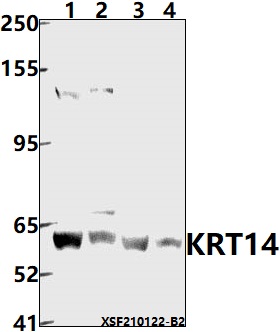Product Name :
Cytokeratin 14/16 (S5) polyclonal antibody Background :
In Bowen’s disease, the characteristic malignancy of the epidermis exhibits distinct expression patterns of Cytokeratin 14. Mutations in the gene encoding human Cytokeratin 14 lead to epidermolysis bullosa simplex, an inheritied skin disorder characterized by skin blistering due to basal keratinocyte fragility.Cytokeratin 16 is expressed in benign stratified squamous epithelium and squamous cell carcinoma of the head and neck, as well as luminal cells of mammary gland and sweat ducts. It is absent in noninvasive breast carcinomas and normal breast tissue. Mutations in the Cytokeratin 16 gene cause various diseases, including pachyonychia congenita type 1 (PC1), nonepidermolytic palmoplantar keratoderma (NEPPK) and unilateral palmoplantar verrucous nevus (UPVN). Product :
Rabbit IgG, 1mg/ml in PBS with 0.02% sodium azide, 50% glycerol, pH7.2 Storage&Stability :
Store at 4°C short term. Aliquot and store at -20°C long term. Avoid freeze-thaw cycles. Specificity :
Cytokeratin 14/16 (S5) polyclonal antibody detects endogenous levels of Cytokeratin 14 and Cytokeratin 16 protein. Immunogen :
Synthetic peptide, corresponding to the N-terminus of Human Cytokeratin 14 Conjugate :
Unconjugated Modification :
Unmodification
Cytokeratin 14/16 (S5) polyclonal antibody Background :
In Bowen’s disease, the characteristic malignancy of the epidermis exhibits distinct expression patterns of Cytokeratin 14. Mutations in the gene encoding human Cytokeratin 14 lead to epidermolysis bullosa simplex, an inheritied skin disorder characterized by skin blistering due to basal keratinocyte fragility.Cytokeratin 16 is expressed in benign stratified squamous epithelium and squamous cell carcinoma of the head and neck, as well as luminal cells of mammary gland and sweat ducts. It is absent in noninvasive breast carcinomas and normal breast tissue. Mutations in the Cytokeratin 16 gene cause various diseases, including pachyonychia congenita type 1 (PC1), nonepidermolytic palmoplantar keratoderma (NEPPK) and unilateral palmoplantar verrucous nevus (UPVN). Product :
Rabbit IgG, 1mg/ml in PBS with 0.02% sodium azide, 50% glycerol, pH7.2 Storage&Stability :
Store at 4°C short term. Aliquot and store at -20°C long term. Avoid freeze-thaw cycles. Specificity :
Cytokeratin 14/16 (S5) polyclonal antibody detects endogenous levels of Cytokeratin 14 and Cytokeratin 16 protein. Immunogen :
Synthetic peptide, corresponding to the N-terminus of Human Cytokeratin 14 Conjugate :
Unconjugated Modification :
Unmodification
-
 Western blot (WB) analysis of KRT14 pAb at 1:500 dilution Lane1:Myla2059 whole cell lysate(40ug) Lane2:EC9706 whole cell lysate(40ug) Lane3:SP2/0 whole cell lysate(40ug) Lane4:C6 whole cell lysate(40ug)
Western blot (WB) analysis of KRT14 pAb at 1:500 dilution Lane1:Myla2059 whole cell lysate(40ug) Lane2:EC9706 whole cell lysate(40ug) Lane3:SP2/0 whole cell lysate(40ug) Lane4:C6 whole cell lysate(40ug)
Differentiation of mouse embryonic stem cells into dental epithelial-like cells induced by ameloblasts serum-free conditioned medium
PMCID: Pubmed No.:20206604
Ameloblasts serum-free conditioned medium: bone morphogenic protein 4-induced odontogenic differentiation of mouse induced pluripotent stem cells
PMCID: Pubmed No.:23606575
Effects of Canonical NF-κB Signaling Pathway on the Proliferation and Odonto/Osteogenic Differentiation of Human Stem Cells from Apical Papilla
PMCID: Pubmed No.:24864235
Interferon-γ regulates the function of mesenchymal stem cells from oral lichen planus via indoleamine 2,3-dioxygenase activity.
PMCID: Pubmed No.:25212102
Interferon-γ regulates the function of mesenchymal stem cells from oral lichen planus via indoleamine 2,3-dioxygenase activity.
PMCID: Pubmed No.:25212102
Bioworld Biotech only provide peptides for our antibodies and do not provide additional peptide customization services.
Price/Size :
USD 368/1mg/vial
Tips:
For phospho antibody, we provide phospho peptide(0.5mg) and non-phospho peptide(0.5mg).Describe :
Blocking peptides are peptides that bind specifically to the target antibody and block antibody binding. These peptide usually contains the epitope recognized by the antibody. Antibodies bound to the blocking peptide no longer bind to the epitope on the target protein. This mechanism is useful when non-specific binding is an issue, for example, in Western blotting (WB) and Immunohistochemistry (IHC). By comparing the staining from the blocked antibody versus the antibody alone, one can see which staining is specific; Specific binding will be absent from the western blot or IHC performed with the neutralized antibody.Formula:
Synthetic peptide was lyophilized with 100% acetonitrile and is supplied as a powder. Reconstitute with 0.1 ml DI water for a final concentration of 10 mg/ml.The purity is >90%,tested by HPLC and MS.
Storage:
The freeze-dried powder is more stable. For short time at 2-8°C. For long term storage store at -20°C.
Note :
This product is for research use only (RUO only). Not for use in diagnostic or therapeutic procedures.
 Cytokeratin 14/16 (S5) polyclonal antibody
Cytokeratin 14/16 (S5) polyclonal antibody  Datasheet
Datasheet COA
COA MSDS
MSDS SHIP
SHIP